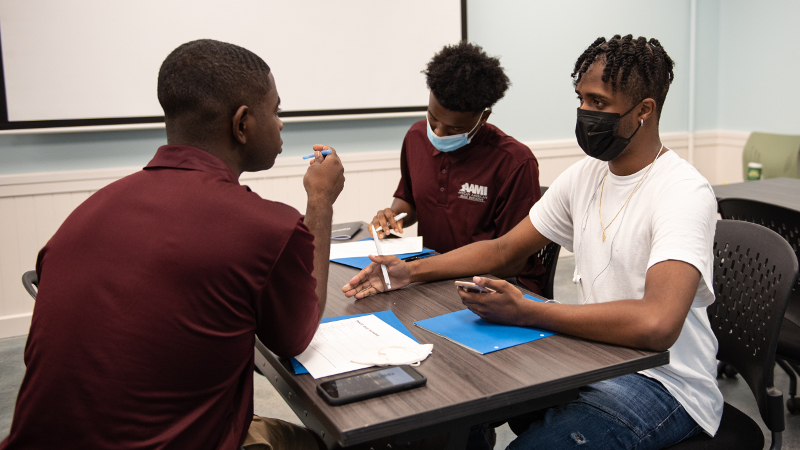Duke Engineering Teams with Durham Success Summit to Provide Entrepreneurial Training to Local Youths
By Ken Kingery
Christensen Family Center partners with Duke graduate’s 12-week mentorship experience for young Black men in Durham

Despite being born and raised in Duke University’s hometown of Durham, North Carolina, Derek Rhodes never set foot on campus before becoming an undergraduate in 2011. After experiencing the wealth of life-changing resources Duke has to offer, and taking advantage of many of them, he set out to find ways that other young Black men in Durham could seize opportunities he never knew existed.
In the middle of 2021, Rhodes focused all of his time and energy on founding the Durham Success Summit (DSS)—a free, 12-week holistic mentorship experience that provides professional development, entrepreneurship education and leadership training to Black male high school and college-enrolled youth in the Durham area.
As the DSS curriculum grows, he’s continually reaching back into his Duke roots to find more opportunities for his students.
In one such opportunity, DSS is partnering with Duke Engineering’s Christensen Family Center for Innovation to offer its expertise in entrepreneurship. Also launched in 2021, the Christensen Family Center serves as a community hub and place educators seek ways to make teaching innovation easier, faster and cheaper. It has developed systems for Duke’s Student Founder program that helps coach entrepreneurs.
“Duke Engineering is at the forefront of innovation, and the evolving curriculum and wealth of opportunities it can provide is a great resource for our scholars,” said Rhodes, who graduated from Duke with a degree in public policy in 2015. “The collaboration will also provide us data and reporting that we haven’t had before, which will help us understand where our scholars’ needs are, identify blockers to success and provide ways to overcome them at the right time.”
“We’re developing soft skills that allow their confidence to grow as their network expands…I’m excited to be able to create the access to these resources that I wish I had prior to becoming a Duke student.”
derek rhodes
When the COVID-19 pandemic hit in early 2020, it forced many of Duke Engineering’s existing innovation and entrepreneurship programs to go digital. While not ideal for many scenarios, the shift allowed engineering entrepreneurship training programs to observe outcomes better and in real-time. It also provided more flexibility to its participants and mentors, while allowing a redesign of the methods to be more easily transferrable to programs outside of Duke’s campus.
“We want to grow outside of the university to create more access and, selfishly, improve our programs,” said Steve McClelland, executive-in-residence at Duke Engineering and leader of many of its innovation and entrepreneurship programs. “Working with students from different backgrounds and in different situations makes us revisit assumptions we make about the questions we ask and how we operate. Offering our curriculum to the cohort Derek has built is an invaluable way for us to test and improve repeatable, scalable systems to help communities of innovation better themselves.”
DSS works as a career readiness accelerator that pairs scholars with mentors for weekly meetings and assignments. Participants identify the skillsets most useful to them and their careers, learn leadership and soft-skill sets, and create connections and networks within the field in which they’re most interested.
Through the 12-week program, scholars will pair these lessons with similar topics, such as combining leadership branding with startup pitching. Throughout the process, scholars will provide surveys and feedback that partners in Duke’s Fuqua School of Business will analyze and use to improve future classes and collaborations.
“Our program develops skills that are transferrable to whatever pursuits a scholar might take on, whether they’re going to start a business or not,” Rhodes said. “We’re developing soft skills that allow their confidence to grow as their network expands. Now we’re taking what Steve and his team have built and adding it to create a wrap-around support system that hasn’t existed before. Students get to create their journey through the program, and I’m excited to be able to create the access to these resources that I wish I had prior to becoming a Duke student.”
